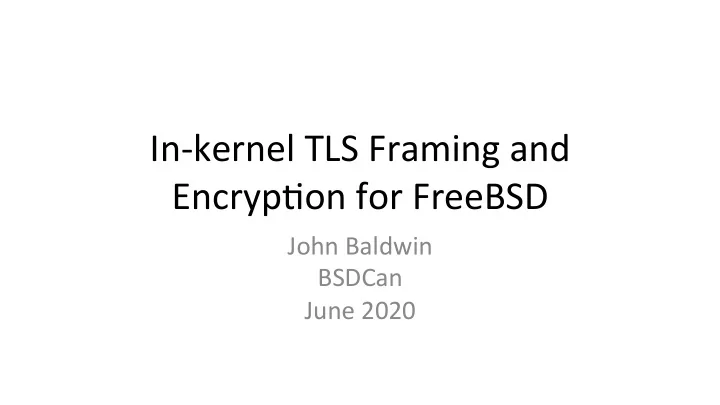

In-kernel TLS Framing and Encryp6on for FreeBSD John Baldwin BSDCan June 2020
Overview • What is KTLS? • TLS Transmit • TLS Receive • Current Status
What is TLS? • Transport Layer Security (TLS) is an applica6on layer protocol • Provides authen6ca6on and privacy • Structured as a stream of records, or frames, sent and received over a transport protocol • Includes handshake messages to nego6ate session keys and applica6on data messages to tunnel applica6on data
What is KTLS? • In-kernel TLS (KTLS) handles TLS framing and encryp6on/decryp6on in the kernel • KTLS does not handle session key nego6a6on – Userland library such as OpenSSL supplies session keys to kernel aQer handshake
Why KTLS? Two reasons to handle TLS in the kernel 1. Enable zero-copy send over TLS via sendfile() 2. Support TLS offload in NICs
TLS Sessions • TLS Sessions describe session keys – Ciphersuite (AES-GCM, AES-CBC with HMAC) – Cipher and MAC keys • SSL library provides session keys via setsockopt() • TLS Sessions are associated with socket buffers – Separate sessions for transmit and receive
TLS Transmit • All data wri\en on a socket using KTLS transmit is encrypted by the kernel • Userland can send individual TLS records with a specific record type and length via sendmsg() – TLS_SET_RECORD_TYPE control message • Kernel chooses framing and uses “applica6on data” record type for all other data
TLS Transmit • TLS records stored in a special type of mbuf – TLS header and trailer stored inline in mbuf – Payload data referenced via physical address pointers • Not-yet-encrypted TLS record mbufs hold a reference to a TLS session – Session reference inherited from socket buffer
TLS Transmit: SW KTLS Applica6on Data Userland write() Kernel Unencrypted ( M_NOTREADY ) Socket Buffer Encrypted TCP Packet NIC
TLS Transmit: SW KTLS Userland sendfile() Kernel Disk Socket Buffer Per-socket Copies TCP Packet NIC
TLS Transmit: NIC/TOE KTLS Applica6on Data Userland write() Kernel Socket Buffer Unencrypted TCP Packet NIC
TLS Transmit: NIC/TOE KTLS Userland sendfile() Kernel Disk Socket Buffer No Copies! TCP Packet NIC
TLS Receive • All data received on a socket using KTLS receive is decrypted by the kernel • Userland receives individual TLS records via recvmsg() – TLS_GET_RECORD control message • Socket buffer holds a list of TLS records like a datagram socket even though TCP is a stream socket
TLS Receive: TOE KTLS Applica6on Data Userland recvmsg() Kernel Socket Buffer TLS PDU Decrypted NIC
TLS Receive: SW KTLS Applica6on Data Userland recvmsg() Kernel Decrypted Socket Buffer Encrypted ( M_NOTREADY ) TCP Packet Encrypted NIC
TLS & Socket Send Buffers • TLS uses send socket buffer in the “usual” way. It is a single “record” holding a stream of TLS mbufs. – Each mbuf describes a single TLS record – Unencrypted records are marked as M_NOTREADY – Both unencrypted and encrypted TLS records live in the same stream – To mark a record as encrypted, clear M_NOTREADY
TLS & Socket Receive Buffers • TLS uses receive socket buffer differently – Decrypted TLS records are stored as “records” in socket buffer consis6ng of control message mbuf holding TLS header followed by decrypted data in “normal” mbufs. No trailer. – Encrypted TLS records received from TCP are just “normal” mbufs with TLS header and trailer data in the mbuf payload – Can’t simply flip M_NOTREADY bit to convert from encrypted to decrypted
Decryp6ng TLS Records • Wait for full TLS record to be received • Decrypt TLS record payload • Allocate control message and copy TLS header into message • Discard TLS header and trailer from “normal” mbufs holding TLS record • Ensure the mbufs holding TLS record aren’t freed out from under decryp6on handler via sbcut(), sbdrop(), or sbflush() • Ensure socket buffer accoun6ng is accurate
Splifng the Receive Buffer Socket Buffer sb_mtls sb_mb
Decryp6ng a TLS Record sb_mtls sb_mb
TLS Receive: NIC TLS (Sketch) sb_mtls sb_mb Decrypted TLS Record Out of order encrypted data
Current Status: Transmit • KTLS Transmit for TLS 1.0-1.3 merged to FreeBSD 13.0- CURRENT – Includes SW TLS, NIC TLS, TOE TLS – ktls_ocf.ko and security/ktls_isa-l_crypto-kmod port/ package • KTLS Transmit for TLS 1.0-1.2 merged to OpenSSL master (will ship in 3.0) • TLS 1.3 for OpenSSL pending review – h\ps://github.com/openssl/openssl/pull/10626
Current Status: Receive • KTLS Receive for TLS 1.1-1.2 via TOE merged to FreeBSD 13.0-CURRENT • KTLS Receive for TLS 1.1-1.2 via SW in progress – h\ps://reviews.freebsd.org/D24628 • KTLS Receive for TLS 1.1-1.2 for OpenSSL pending review – h\ps://github.com/openssl/openssl/pull/11679
Current Status: nginx • nginx patches to support SSL_sendfile() – h\ps://github.com/nginx/nginx/compare/ branches/stable-1.14...bsdjhb:ktls-1.14-openssl- master – h\ps://github.com/nginx/nginx/compare/ branches/stable-1.16...bsdjhb:ktls-1.16
Further WIP • Improving KTLS performance using OCF – Goal is to bring aesni.ko and ktls_ocf.ko on par with security/ktls_isa-l_crypto-kmod • Adding support for TLS 1.1 (and maybe 1.0) transmit to SW KTLS via OCF • Adding support for TLS 1.3 receive to SW KTLS • Making OpenSSL KTLS available via base or ports • Adding SSL_sendfile() support to nginx port
Recommend
More recommend